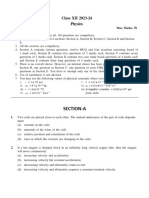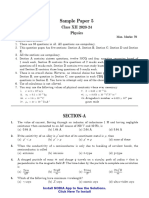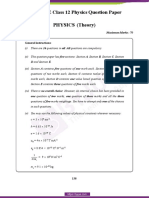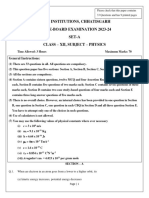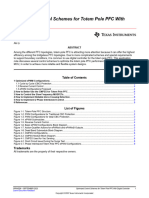Board Question Paper: March 2014 Physics - Ii: Section - Ii Q. 5. Attempt Any SIX
Board Question Paper: March 2014 Physics - Ii: Section - Ii Q. 5. Attempt Any SIX
Uploaded by
Sachin DedhiaCopyright:
Available Formats
Board Question Paper: March 2014 Physics - Ii: Section - Ii Q. 5. Attempt Any SIX
Board Question Paper: March 2014 Physics - Ii: Section - Ii Q. 5. Attempt Any SIX
Uploaded by
Sachin DedhiaOriginal Description:
Original Title
Copyright
Available Formats
Share this document
Did you find this document useful?
Is this content inappropriate?
Copyright:
Available Formats
Board Question Paper: March 2014 Physics - Ii: Section - Ii Q. 5. Attempt Any SIX
Board Question Paper: March 2014 Physics - Ii: Section - Ii Q. 5. Attempt Any SIX
Uploaded by
Sachin DedhiaCopyright:
Available Formats
BOARD QUESTION PAPER: MARCH 2014
PHYSICS – II
Note:
i. All questions are compulsory.
ii. Neat and well labelled diagrams must be drawn wherever necessary.
iii. Figures to the right indicate full marks.
iv. Use of only logarithmic table is allowed.
v. All symbols have their usual meaning unless otherwise stated.
SECTION – II
Q. 5. Attempt any SIX : [12]
eVr
i. Show that the orbital magnetic dipole moment of a revolving electron is .
2
ii. Describe the construction of photoelectric cell.
iii. For a glass plate as a polariser with refractive index l.633, calculate the angle of incidence at
which light is polarised.
iv. The susceptibility of magnesium at 300 K is 2.4 105. At what temperature will the
susceptibility increase to 3.6 105?
v. Draw a neat labelled diagram for Davisson and Germer experiment, for diffraction of electron
wave.
vi. Explain the terms : (a) Transmitter and (b) Receiver in communication system.
1
vii. A metal rod m long rotates about one of its ends perpendicular to a plane whose
magnetic induction is 4 103 T. Calculate the number of revolutions made by the rod per
second if the e.m.f. induced between the ends of the rod is 16 mV.
viii. Find the wave number of a photon having energy of 2.072 eV.
Given : Charge on electron = 1.6 1019 C,
Velocity of light in air = 3 108 m/s,
Planck’s constant = 6.63 1034 J-s.
Q. 6. Attempt any THREE : [9]
i. State Ampere’s circuital law. Obtain an expression for magnetic induction along the axis of
toroid.
ii. Calculate the radius of second Bohr orbit in hydrogen atom from the given data.
Mass of electron = 9.1 1031kg
Charge on the electron = 1.6 1019 C
Planck’s constant = 6.63 1034 Js.
Permittivity of free space = 8.85 1012 C2/Nm2
iii. Explain the working of P-N junction diode in forward and reverse biased mode.
iv. A network of four capacitors of 6 F each is connected to a 240 V supply. Determine the
charge on each capacitor.
6 F
C2
6 F C1 C3 6 F
C4
6 F
240 V
Q.7. A. Describe biprism experiment to find the wavelength of monochromatic light. Draw the
necessary ray diagram for magnified and diminished images of virtual sources.
B. If the difference in velocities of light in glass and water is 2.7 107 m/s, find the velocity of
light in air.
(Refractive index of glass = 1.5, Refractive index of water = 1.333) [7]
OR
A. State the principle of a transformer. Explain its construction and working. Derive an
expression for the ratio of e.m.f.s in terms of number of turns in primary and secondary coil.
B. Two diametrically opposite points of a metal ring are connected to two terminals of the left
gap of meter bridge. The resistance of 11 is connected in right gap. If null point is obtained
at a distance of 45 cm from the left end, find the resistance of metal ring. [7]
Q. 8. Select and write the most appropriate answer from the given alternatives for each
sub-question: [7]
i. Intensity of electric field at a point close to and outside a charged conducting cylinder is
proportional to ______.
(r is the distance of a point from the axis of cylinder)
1 1
(A) (B)
r r2
1
(C) (D) r3
r3
ii. When a hole is produced in P-type semiconductor, there is _______.
(A) extra electron in valence band.
(B) extra electron in conduction band.
(C) missing electron in valence band.
(D) missing electron in conduction band.
iii. The outermost layer of the earth’s atmosphere is _______.
(A) stratosphere (B) mesosphere
(C) troposphere (D) ionosphere
iv. Accuracy of potentiometer can be easily increased by _______.
(A) increasing resistance of wire (B) decreasing resistance of wire
(C) increasing the length of wire (D) decreasing the length of wire
v. When electron in hydrogen atom jumps from second orbit to first orbit, the wavelength of
radiation emitted is . When electron jumps from third orbit to first orbit, the wavelength of
emitted radiation would be _______.
27 32
(A) (B)
32 27
2 3
(C) (D)
3 2
vi. An ideal voltmeter has _______.
(A) low resistance (B) high resistance
(C) infinite resistance (D) zero resistance
vii. The resolving power of telescope of aperture 100 cm for light of wavelength 5.5 107 m is
_______.
(A) 0.149 10+7 (B) 1.49 10+7
(C) 14.9 10+7 (D) 149 10+7
You might also like
- Motion Breakdown Drills PDFDocument5 pagesMotion Breakdown Drills PDFMaurizio PietrelliNo ratings yet
- Target Publications: Board Question Paper: February 2023Document4 pagesTarget Publications: Board Question Paper: February 2023Aditya BadeNo ratings yet
- Physics March 2020 STD 12th Science HSC Maharashtra Board Question PaperDocument3 pagesPhysics March 2020 STD 12th Science HSC Maharashtra Board Question PaperSneha PatilNo ratings yet
- Physics 2020 HSC PaperDocument3 pagesPhysics 2020 HSC Paperparth BhanushaliNo ratings yet
- STD 12 Physics 2 Board Question Paper Maharashtra BoardDocument6 pagesSTD 12 Physics 2 Board Question Paper Maharashtra BoardTashvi Kulkarni100% (1)
- FLT - Iii (2016-17)Document4 pagesFLT - Iii (2016-17)ChetanNo ratings yet
- Class 12 Series 2 PhysicsDocument10 pagesClass 12 Series 2 Physicsgarvit1223No ratings yet
- FpreboardDocument4 pagesFpreboardDrDinesh KumarNo ratings yet
- Physics Practice Paper - IIIDocument3 pagesPhysics Practice Paper - IIImehul yoNo ratings yet
- Cblephpu 05Document6 pagesCblephpu 05Unknown MrNo ratings yet
- Physics SQP - 04 Latest (2023) Class 12 CBSEDocument28 pagesPhysics SQP - 04 Latest (2023) Class 12 CBSEmr mindNo ratings yet
- PhysicsDocument9 pagesPhysicsAnsh MishraNo ratings yet
- 2015 OctoberDocument4 pages2015 Octoberrishanahmed01No ratings yet
- Physics Class 12Document6 pagesPhysics Class 12EVAN GERSHONNo ratings yet
- Karnataka 2nd Puc MQP 2023 Physics PDFDocument4 pagesKarnataka 2nd Puc MQP 2023 Physics PDFAkash AkashNo ratings yet
- 151-Physics eDocument6 pages151-Physics ekumardeekxetNo ratings yet
- Physics Exclusive Sample PapersDocument6 pagesPhysics Exclusive Sample Papersgauraadi739No ratings yet
- Physics PQ2Document7 pagesPhysics PQ2David BamNo ratings yet
- Test Paper 9Document7 pagesTest Paper 9rajeshsharma4121No ratings yet
- Board Question Paper February 2024 - 65ddd25fc0b76Document4 pagesBoard Question Paper February 2024 - 65ddd25fc0b76Vignesh ParabNo ratings yet
- Physics SQP - 12 Latest (2023) Class 12 CBSEDocument31 pagesPhysics SQP - 12 Latest (2023) Class 12 CBSEmr mindNo ratings yet
- ModelPapers MODELPAPER10 Physics12Document1 pageModelPapers MODELPAPER10 Physics12Maulik KarasaliyaNo ratings yet
- Physics Set 1Document4 pagesPhysics Set 1Krishna PawarNo ratings yet
- CBSE Class 12 Question Paper 2015 Physics Set 1Document9 pagesCBSE Class 12 Question Paper 2015 Physics Set 1PallavNo ratings yet
- Wa0057.Document8 pagesWa0057.Mahesh DhakalNo ratings yet
- Paper 9Document8 pagesPaper 9zeeltarpara97560No ratings yet
- Goa Board Physics 2018 June PaperDocument7 pagesGoa Board Physics 2018 June PaperSphoortiN XII B 927No ratings yet
- 6.XII Physics Question PaperDocument8 pages6.XII Physics Question PaperEMMANUEL PHILIP REJI CLASS XNo ratings yet
- Physics Set ADocument21 pagesPhysics Set AnayanasuzanneNo ratings yet
- PM Shri Kendriya Vidyalaya Gachibowli, Gpra Campus, Hyd-32: Sample Paper Test 11 For Board Exam 2024Document6 pagesPM Shri Kendriya Vidyalaya Gachibowli, Gpra Campus, Hyd-32: Sample Paper Test 11 For Board Exam 2024maxers.xdNo ratings yet
- Physics Model Paper - 4Document7 pagesPhysics Model Paper - 4bharathbodapati09042007bbNo ratings yet
- 12th Physics II Term Test 2017 - 18Document3 pages12th Physics II Term Test 2017 - 18hodeegits9526No ratings yet
- Xii Physics Set-ADocument9 pagesXii Physics Set-AAshik Anamic ShimiyaNo ratings yet
- XII - Physics - Preboard 1 - Set A 2023Document6 pagesXII - Physics - Preboard 1 - Set A 2023Anuradha MukherjeeNo ratings yet
- 2022-23. 12 FinalDocument5 pages2022-23. 12 FinalSrushti ChouguleNo ratings yet
- Physics XII QP Set 1Document10 pagesPhysics XII QP Set 1meme MachineNo ratings yet
- Practice Paper Pre Board Xii Phy 2023-24Document11 pagesPractice Paper Pre Board Xii Phy 2023-24Buvaneswari SriniNo ratings yet
- Sample Paper +2 Physics 1 (15.01.23)Document7 pagesSample Paper +2 Physics 1 (15.01.23)dhuriaajayNo ratings yet
- HSC Maths 2014 Part 2Document2 pagesHSC Maths 2014 Part 2Sachin DedhiaNo ratings yet
- Class 12 Physics SP 20Document8 pagesClass 12 Physics SP 20Rakesh Kumar Agarwal lNo ratings yet
- Physics Final 22Document7 pagesPhysics Final 22AYAN SINGHNo ratings yet
- SecquizDocument3 pagesSecquizdeezm579No ratings yet
- Pre - Board 3 Class XII PhysicsDocument5 pagesPre - Board 3 Class XII PhysicsRaj Das MunshiNo ratings yet
- Model Paper 01-SSC-IIDocument11 pagesModel Paper 01-SSC-IIPasha KhanNo ratings yet
- Revision Assignment Class 10 PhysicsDocument12 pagesRevision Assignment Class 10 PhysicsKayNo ratings yet
- Physics Sample Paper5Document4 pagesPhysics Sample Paper5Àmìt TíggáNo ratings yet
- Kendriya Vidyalaya Sangathan Kolkata Region Pre-Board Examination 2020-21 Class - Xii Subject:PhysicsDocument7 pagesKendriya Vidyalaya Sangathan Kolkata Region Pre-Board Examination 2020-21 Class - Xii Subject:PhysicsShivankar PandeyNo ratings yet
- Physics Sample Papers 2022-23Document245 pagesPhysics Sample Papers 2022-23AsherNo ratings yet
- SAMPLE QUESTION PAPER - XII - Physics2023-24Document6 pagesSAMPLE QUESTION PAPER - XII - Physics2023-24Nandita SharmaNo ratings yet
- Hsslive Xii Phy March 2020 QPDocument8 pagesHsslive Xii Phy March 2020 QPalbedo16163No ratings yet
- Question 1436469Document3 pagesQuestion 1436469rajvanshiaditya549No ratings yet
- PB XII Phy QP Nov 2022Document8 pagesPB XII Phy QP Nov 2022Ayushi KayalNo ratings yet
- Mock PB 23-1Document11 pagesMock PB 23-1Kshitij YadavNo ratings yet
- P2 S6 Test Phy Paper IIDocument3 pagesP2 S6 Test Phy Paper IIabrahambyomuhangi1No ratings yet
- Question Paper Physics PB I 2023-24Document6 pagesQuestion Paper Physics PB I 2023-24rishirajkaran2006No ratings yet
- J 837 d7cbf5fbddDocument8 pagesJ 837 d7cbf5fbddSanchita SahooNo ratings yet
- Class-Xii - Final Cbse Board Physics Sample Paper-2Document7 pagesClass-Xii - Final Cbse Board Physics Sample Paper-2kamali.v777No ratings yet
- Cblephpu 06Document6 pagesCblephpu 06Tulasi SethiNo ratings yet
- Phy Set-2 QPDocument5 pagesPhy Set-2 QPSiddhartha HadimaniNo ratings yet
- 270000313-Sample Paper 7Document6 pages270000313-Sample Paper 7sithur2305No ratings yet
- Vacuum Nanoelectronic Devices: Novel Electron Sources and ApplicationsFrom EverandVacuum Nanoelectronic Devices: Novel Electron Sources and ApplicationsNo ratings yet
- Aldehyde 1 To 5 JEE & NEET Roboassess Question CodeDocument4 pagesAldehyde 1 To 5 JEE & NEET Roboassess Question CodeSachin DedhiaNo ratings yet
- Chemistry Paper Pattern Vasai 26.05.19: Section A Q.1 1M Q.2 1M Q.3 1M Section BDocument1 pageChemistry Paper Pattern Vasai 26.05.19: Section A Q.1 1M Q.2 1M Q.3 1M Section BSachin DedhiaNo ratings yet
- STD 12 Maths 2 Board Question Paper Maharashtra Board PDFDocument6 pagesSTD 12 Maths 2 Board Question Paper Maharashtra Board PDFSachin DedhiaNo ratings yet
- HSC Maths 2014 Part 2Document2 pagesHSC Maths 2014 Part 2Sachin DedhiaNo ratings yet
- HSC Maths 2014 Part 2Document2 pagesHSC Maths 2014 Part 2Sachin DedhiaNo ratings yet
- HSC Chemistry 2014 Part 1Document2 pagesHSC Chemistry 2014 Part 1Sachin DedhiaNo ratings yet
- Board Question Paper: March 2014 Biology - IiDocument2 pagesBoard Question Paper: March 2014 Biology - IiSachin DedhiaNo ratings yet
- HSC Maths 2014 Part 1Document2 pagesHSC Maths 2014 Part 1Sachin DedhiaNo ratings yet
- HSC Maths II Board Paper 2013Document2 pagesHSC Maths II Board Paper 2013Sachin DedhiaNo ratings yet
- HSC Maths I Board Paper 2013Document2 pagesHSC Maths I Board Paper 2013Sachin DedhiaNo ratings yet
- HSC Biology Feb 2014 Part 1Document2 pagesHSC Biology Feb 2014 Part 1Sachin DedhiaNo ratings yet
- Prelim - I Chem - Section II - QDocument3 pagesPrelim - I Chem - Section II - QSachin DedhiaNo ratings yet
- HSC Zoology Board Paper 2013Document2 pagesHSC Zoology Board Paper 2013Sachin DedhiaNo ratings yet
- HSC Botany Board Paper 2013Document2 pagesHSC Botany Board Paper 2013Sachin DedhiaNo ratings yet
- NEET - Haloalkanes & Haloarenes - (Q+S)Document18 pagesNEET - Haloalkanes & Haloarenes - (Q+S)Sachin DedhiaNo ratings yet
- No. Topics Total VS BO 13 General Organic Chemistry 21 CSD CSD 14 Isomerism 9 CSD CSDDocument1 pageNo. Topics Total VS BO 13 General Organic Chemistry 21 CSD CSD 14 Isomerism 9 CSD CSDSachin DedhiaNo ratings yet
- JEE - Haloalkanes & Haloarenes - (Q+S)Document13 pagesJEE - Haloalkanes & Haloarenes - (Q+S)Sachin DedhiaNo ratings yet
- Urban Vs RuralDocument4 pagesUrban Vs Ruralyuktha N GowdaNo ratings yet
- ACR Safety MatsDocument3 pagesACR Safety Matsjinyuan74No ratings yet
- Module 1 - EwDocument43 pagesModule 1 - EwMurtaza Hassan Bhat100% (1)
- Roland JWX-30 Set UpDocument62 pagesRoland JWX-30 Set UpDragos Manzateanu0% (1)
- Air Conditioning SystemDocument15 pagesAir Conditioning SystemSamer Zebare100% (1)
- Doors For Healthcare Systems PDFDocument48 pagesDoors For Healthcare Systems PDFbrot tamaNo ratings yet
- Daftar Harga Aice New .XLSX - Sheet1Document2 pagesDaftar Harga Aice New .XLSX - Sheet1azizluthfiee97No ratings yet
- 255 Item Mathematics With Detailed SolutionsDocument29 pages255 Item Mathematics With Detailed SolutionsCHRISTLER GALABONo ratings yet
- The Importance of Sustainable LivingDocument2 pagesThe Importance of Sustainable LivingValeria MeilánNo ratings yet
- Format Data GNSS Dan Aplikasinya PDFDocument43 pagesFormat Data GNSS Dan Aplikasinya PDFdediatunggalNo ratings yet
- Experiment 2 - Plot of The Annual Load Curve.Document6 pagesExperiment 2 - Plot of The Annual Load Curve.Mahesh KambleNo ratings yet
- BS 598-Part 100-87Document12 pagesBS 598-Part 100-87jitheshksNo ratings yet
- CNS McqsDocument54 pagesCNS McqsMohammed KhalidNo ratings yet
- Transducers ExercisesDocument7 pagesTransducers ExercisesjolieprincesseishimweNo ratings yet
- TOS in Pre-CalculusDocument1 pageTOS in Pre-CalculusJonathan OlegarioNo ratings yet
- Class - XII Subject: Economics: Read The Following Hypothetical Text and Answer The Given QuestionsDocument6 pagesClass - XII Subject: Economics: Read The Following Hypothetical Text and Answer The Given QuestionsBhawana SinghNo ratings yet
- Optimized Control Schemes For PFC With Digital ControllerDocument10 pagesOptimized Control Schemes For PFC With Digital ControllersagarNo ratings yet
- Electric Motor Analysis PDFDocument51 pagesElectric Motor Analysis PDFantok09No ratings yet
- BCT-Syllabus-1st-Year-1st-Part (1) - UnknownDocument22 pagesBCT-Syllabus-1st-Year-1st-Part (1) - Unknownishanpokhrel16No ratings yet
- Escano Sumaylo 2017 Meaning Making Exercise Using Images and Soundscape The Case of San Pedro Street Davao CityDocument12 pagesEscano Sumaylo 2017 Meaning Making Exercise Using Images and Soundscape The Case of San Pedro Street Davao CitySpeed Jhon FrancisNo ratings yet
- .Bionic Eye A New InventionDocument4 pages.Bionic Eye A New InventionSharadhiNo ratings yet
- Propane Fueled VehiclesDocument2 pagesPropane Fueled VehiclesMr. CatdogNo ratings yet
- WORK ORDER For TilingDocument6 pagesWORK ORDER For TilingOm Krish Ram0% (1)
- Imo - Survey Guidelines Under The Harmonized System of Survey and Certification (HSSC) 2019Document222 pagesImo - Survey Guidelines Under The Harmonized System of Survey and Certification (HSSC) 2019s0606No ratings yet
- Manual Gamma 1008Document76 pagesManual Gamma 1008gabrielneryNo ratings yet
- Coaching Notes Math 2Document221 pagesCoaching Notes Math 2nathaniel villanuevaNo ratings yet
- Locomotor and Non Locomotor SkillsDocument2 pagesLocomotor and Non Locomotor Skillslyk zNo ratings yet
- Anti-Inflammatory Diet and FoodsDocument2 pagesAnti-Inflammatory Diet and FoodsTayyab Tahir Minhas100% (1)
- Curriculum Vitae: Dr. Sohail AhmadDocument7 pagesCurriculum Vitae: Dr. Sohail AhmadTanveerNo ratings yet






